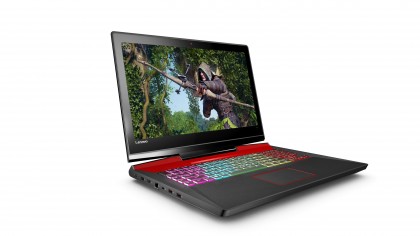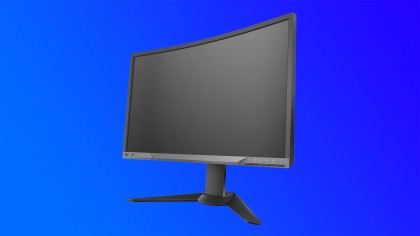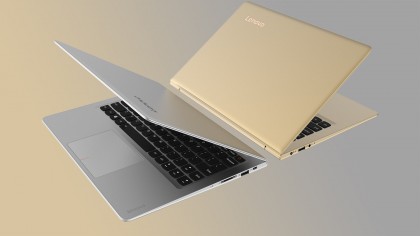
Lenovo has introduced some incredibly thin and light laptops last year with the Yoga 900 and LaVie Z, respectively. This year, however, the Beijing-based electronics firm has introduced its thinnest device yet with the Lenovo Yoga 900S.
As the moniker might suggest the Yoga 900S is a slimmed down version of the Yoga 900 featuring the same watchband hinge. It ditches the 13.3-inch 3,200 x 1,800 display for a lower-res, but still sharp 12.5-inch QHD (2,560 x 1,440) display, while trading in Intel Core I-Series power for a Core m7 processor.
As a result, the 900S measures just 0.5-inches (12.8mm) and weighs 2.2 pounds (0.99kg) thanks to its beautifully slim carbon fiber chassis. Comparatively the 0.59-inch (15mm) Lenovo Yoga 900 weighs in at 2.96 pounds (1.35kg). Even the Apple's extremely slimmed down MacBook 0.51-inches (13.1mm) can't compare – though it is lighter at 2.03 pounds (0.92kg) – and Lenovo didn't have to sacrifice the laptop's full-sized USB 3.0 port either.
Although the Yoga 900S is extremely light and thin, Lenovo says it should still get you through a long flight with 10.5 hours of battery life on local video playback. Users will also be able to configure their system with up to 512GB of PCIe SSD storage and 8GB of DDR3 memory.
The Yoga 900S laptop starts at $1,099 (about £745, AU$1,506) and will be available starting in March.

Lenovo's biggest gaming notebook
On the opposite end of the spectrum. Lenovo is getting serious about gaming laptops and has introduced a monstrous ideapad Y900.
Measuring 1.41inches thick and weighting just over 10 pounds, this 17.3-inch gaming laptop plans to go head to head with giants like the Alienware 17 and Origin EON17-X. It comes fitted with an overclockable Intel Skylake Core i7 processor and Nvidia GTX 980M for graphics. Storage and memory wise, the system is configurable with up to a 512GB SSD and 64GB of DDR4 RAM.
Sign up for breaking news, reviews, opinion, top tech deals, and more.
Lenovo has also outfitted its high-end gaming platform with two-watt JBL speakers plus a subwoofer. Sadly the 17.3-inch screen is limited to only a 1,920 x 1,080 panel, so if you want high-res gaming, you'll have to plug in an external monitor.
The Lenovo ideapad Y900 will launch in June with a starting price of $1,999 (about £1,363, AU$2,796).

Amping up gamers
Lenovo also announced its first curved gaming monitor, the Y27g. At 27-inches diagonally and featuring a Full HD 1,920 x 1,080 resolution, the screen offers an immersive 178-degree field of view.
The 144hz, G-Sync enabled display will release in June for $549 (about £373, AU$752) and there's also a Razer-branded version that retail for $599 (about £407, AU$821). Lenovo also plans to release a Razer-branded version of its ideacenter Y900 gaming tower for $2,299 (about £1,560, AU$3,151) in the same month.

New thin and light laptops
Last but not least, Lenovo has announced two solid notebooks for users who want something a bit simpler with a brass tax laptop.
The Lenovo ideapad 710S a thin and light notebook featuring 13.3-inch, 1080p IPS display with thin 5mm bezels. Its internal specs include a 6th generation Intel Core i7 processor with Intel Iris graphics and it's customizable with up to 8GB of RAM and 256GB of SSD storage.
The Lenovo ideapad 700 is the 710S' bigger 15.6-inch or 17.3-inch brother. Aside from the bigger chassis, this laptop comes packing discrete graphics with either a Nvidia GT 940M or 950M chip depending on how you configure it. Users will also have the option of adding on a 1TB HDD or hybrid hard drive.
The Lenovo ideapad 700 will arrive in June with a starting price of $799 (about £542, AU$1,095), and then a month later the ideapad 710S will launch with base models going for $799 (about £542, AU$1,095).
- Apple might have more to worry about from Samsung

Kevin Lee was a former computing reporter at TechRadar. Kevin is now the SEO Updates Editor at IGN based in New York. He handles all of the best of tech buying guides while also dipping his hand in the entertainment and games evergreen content. Kevin has over eight years of experience in the tech and games publications with previous bylines at Polygon, PC World, and more. Outside of work, Kevin is major movie buff of cult and bad films. He also regularly plays flight & space sim and racing games. IRL he's a fan of archery, axe throwing, and board games.